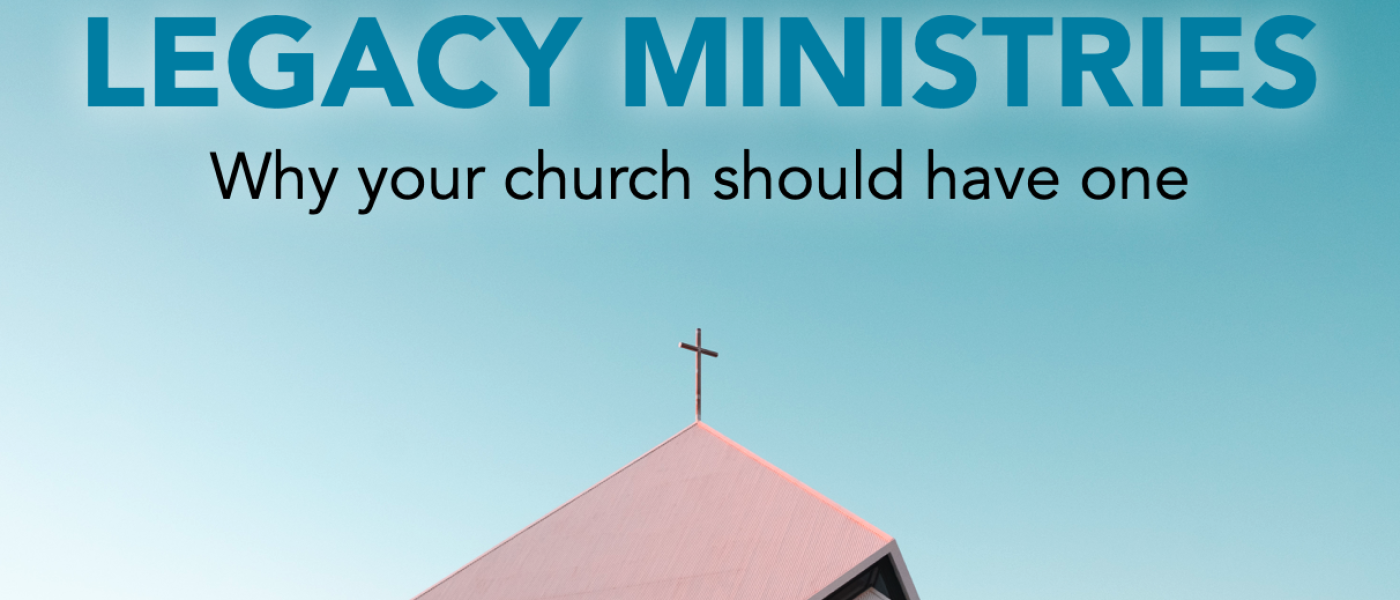Why Your Church Should Have a Legacy Ministry
By Rev. Bill Gruenewald
A legacy ministry is a powerful way to propel your church’s mission for years to come. It provides an additional stream of steady income for your church, allowing the congregation to continue its Kingdom work well into the future. Unfortunately, many churches miss out on this powerful opportunity to fuel their mission because they don’t know about it, don’t understand it, or think it’s too complicated.
The truth is, any church can set up a legacy ministry with much less work than you might think — and when you do, you’ll wonder why you didn’t do it sooner.
What is a legacy ministry?
A legacy ministry is a planned giving program that allows church members to designate a part of their estate to be given to the church after they die. It’s significant because even though church members often give cash assets regularly throughout their life, only five percent of a person’s assets are typically liquid, like cash. The remaining 95 percent is represented in nonliquid assets like real estate, stocks or mutual funds, and retirement accounts. Most of the time, the largest one-time charitable gift a person will make is through their will.
By including the church in their estate plan, church members can make a one-time gift to the legacy ministry and use the gifts with which God has blessed them to carry out Kingdom purposes, well beyond their lifetime.
Unfortunately, for many congregations, legacy giving is often left out of the stewardship conversation — and in our experience most churches do not have legacy ministries established. With so much emphasis on the church’s operating budget and the weekly giving, congregations are unaware their assets can be used to impact the Kingdom after they have left this earth.
By prioritizing legacy giving, church leadership will not only foster a culture of intentional stewardship in their congregation, they’ll set up their church for longevity as a ministry.
Why should Christians care about estate planning?
Estate plans are critically important to ensure your assets are managed the way you want without any ambiguity. But 70 percent of Americans die without one in place. Often it’s because they feel like it’s too complicated, or they simply don’t want to think about the end of their life. Estate plans can actually be quite simple to set up, and while everyone should have one, Christians in particular should be intentional about it.
As believers, we know that nothing we have is truly our own. God has blessed us with assets to steward well and use to show His love to others and bring Him glory. Without an estate plan, Christians miss out on an enormous opportunity for this kind of Kingdom impact — most likely the largest opportunity they’ll ever have to do so.
As followers of Christ, we also know that we do not have to fear death, because He has overcome it. If we are believers, we don’t have to feel uncomfortable talking about the end of this life, because it simply means we’re entering a better one, passing the torch to the next generation of believers.
Through an estate plan, you get to explicitly state how you want your assets to be distributed, which means you can designate legacy gifts to causes and organizations you believe in. Without one, you leave that distribution up to the state laws, which will certainly not consider your church. If we want to be faithful stewards of what God has given us, we have to also plan for what will happen to those assets when we leave this earth.
An estate plan is an opportunity to not only bless the church when you pass, but well into the future — if they have a legacy ministry in place.
How does legacy giving work?
Once a member decides to include a legacy gift to your church in his or her estate plan, you can accept them via your legacy ministry. You can set up the ministry to reflect your church’s unique values and passions — an extension of your mission. The Legacy Fund will also generate interest income that can be used for ministries not in the budget, or for new initiatives the church feels called to do but isn’t able to fund.
A legacy ministry is also a steady support through any future tough times your congregation may face. Over the last year, many churches have struggled with weekly giving because we have not been able to gather in person due to the pandemic. Though regular giving will typically be the primary way we fund day-to-day ministry needs, a legacy ministry offers extra support to help carry through times like these.
How do I set up a legacy ministry?
If your church is interested in establishing a legacy ministry, the Tennessee Baptist Foundation is here to help. We are passionate about helping Tennessee Baptists steward well the material wealth God has given them and helping church members expand their commitment to stewardship beyond regular tithes and offerings. Legacy ministries are a great way to invite your congregation to be a part of this kind of long-term Kingdom impact.
Don’t miss out on this incredible opportunity for your church to invest in the next generation of believers and change the world with Kingdom work.
Call us at 615-371-2029 to talk about setting up a legacy ministry for your church today!
Ready to get started?
You can reach us via phone at (615) 371-2029 or fill out this form.
Please note that the advice offered in this article is not intended to be construed as tax, legal or accounting advice. This material has been prepared for general informational purposes only and is not intended to provide, and should not be relied on for, tax, legal or accounting advice for the reader. You should consult your own tax, legal and accounting advisors before engaging in any transaction.


